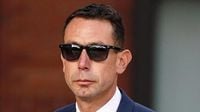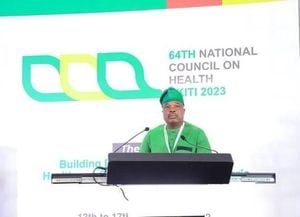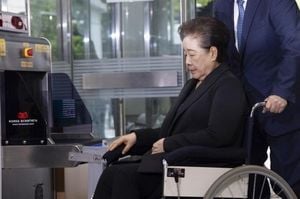Former Premier League referee David Coote, once a familiar face on some of English football’s biggest stages, now finds himself at the center of a high-profile legal case. On September 11, 2025, Coote, aged 43 and hailing from Collingham, Nottinghamshire, appeared at Nottingham Magistrates’ Court to face a charge of making an indecent image of a child—a Category A offence, the most serious in its class. According to Sky News and BBC, this charge relates to a video file recovered by Nottinghamshire Police officers in February 2025, following an investigation that culminated in his formal charging on August 12.
During the 18-minute hearing, Coote, dressed in a navy suit, spoke only to confirm his name and date of birth, and to enter a plea of not guilty. District Judge Gillian Young presided over the session, granting Coote conditional bail and scheduling his next court appearance—a plea and trial preparation hearing—at Nottingham Crown Court for October 9, 2025. The legal process now moves forward under the scrutiny of the public and the footballing world alike.
The charge of making an indecent image of a child, as outlined by The Guardian and BBC, encompasses activities such as downloading, sharing, or saving abusive photos or videos. Category A, the classification applied in this case, denotes the gravest types of material, often involving the most severe forms of child exploitation. While the details of the video file in question have not been made public, the gravity of the charge alone has sent ripples through both the sporting and legal communities.
Coote’s legal troubles have arrived on the heels of a tumultuous period in his professional life. In December 2024, he was dismissed by Professional Game Match Officials Limited (PGMOL)—the body responsible for overseeing match officials in English football—after a separate controversy erupted. A video circulated widely on social media, appearing to show Coote making derogatory remarks about Liverpool Football Club and their then-manager, Jürgen Klopp. That incident led to his sacking by PGMOL and an additional eight-week suspension handed down by the Football Association in August 2025, as reported by Sky News.
The fallout from the Klopp video did not end with domestic football authorities. UEFA, European football’s governing body, imposed a ban on Coote until June 30, 2026, further curtailing his ability to officiate at the highest levels of the game. The sequence of disciplinary actions effectively ended what had been a significant refereeing career, marked by high-profile matches and a steady rise through the ranks.
Before his dismissal, Coote had built an impressive résumé. According to The Guardian, he officiated 112 Premier League games, 143 Championship matches, and 30 FA Cup fixtures, in addition to four international friendlies. His presence on the pitch was well-known to players, managers, and fans, and he was often entrusted with matches of considerable importance. However, his career trajectory took a sharp turn following the controversies and the subsequent criminal charge.
Adding another layer to the public’s perception of Coote, he came out as gay in January 2025, revealing that he had kept his sexuality private for years out of fear of abuse and discrimination within the football community. In his coming out, Coote spoke candidly about the challenges he faced: “I hid who I was because I was afraid of the abuse I’d get if people knew,” he told The Guardian. The revelation was met with support from many corners of the football world, but it also underscored the pressures and scrutiny faced by those in the public eye.
The legal proceedings now underway have inevitably invited intense media attention and a flurry of commentary from all sides. Many in the football community, as well as the general public, have expressed shock and concern over the nature of the allegations. The fact that the charge is categorized as Category A, the most severe, only heightens the seriousness with which the case is being treated by both law enforcement and the courts.
Coote’s legal team has maintained his innocence, and the process will play out in the coming months as the case moves to Crown Court. The presumption of innocence remains a cornerstone of the British legal system, and Coote’s plea of not guilty ensures that the evidence will be examined in detail before any verdict is reached.
In the meantime, the impact of the case on the broader world of football cannot be overstated. The role of referees has always been fraught with pressure and controversy, but rarely has an official found themselves embroiled in allegations of this magnitude. The situation has prompted renewed discussions about the responsibilities and conduct of those in positions of authority within sport, as well as the procedures for vetting and disciplining officials.
The case also raises difficult questions about privacy, accountability, and the intersection of personal conduct with public roles. For many, the fact that Coote’s earlier dismissal and suspensions stemmed from inappropriate comments about a manager, rather than criminal behavior, highlights the spectrum of issues that can arise for those in the spotlight. The transition from disciplinary action over speech to criminal proceedings over alleged actions is a stark one, and it has left many observers grappling with the broader implications for football governance and safeguarding.
As the October 9 court date approaches, the football community and the public at large will be watching closely. The outcome of the proceedings will not only determine Coote’s personal fate but may also set precedents for how similar cases are handled in the future. For now, the case remains a sobering reminder of the responsibilities that come with authority and the far-reaching consequences when those in trusted positions are accused of serious wrongdoing.
While the legal process unfolds, one thing is clear: the story of David Coote has shifted from the roar of the crowd and the glare of stadium lights to the quiet, tense atmosphere of the courtroom. The next chapter will be written not on the pitch, but in the halls of justice.





